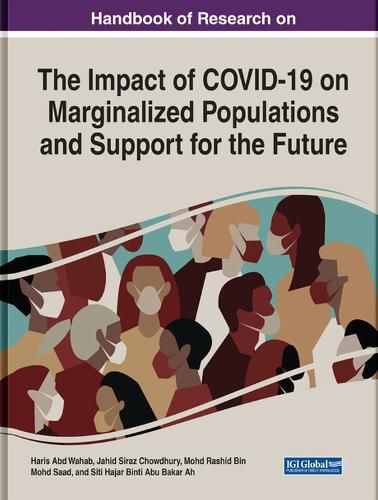Readings Newsletter
Become a Readings Member to make your shopping experience even easier.
Sign in or sign up for free!
You’re not far away from qualifying for FREE standard shipping within Australia
You’ve qualified for FREE standard shipping within Australia
The cart is loading…






This title is printed to order. This book may have been self-published. If so, we cannot guarantee the quality of the content. In the main most books will have gone through the editing process however some may not. We therefore suggest that you be aware of this before ordering this book. If in doubt check either the author or publisher’s details as we are unable to accept any returns unless they are faulty. Please contact us if you have any questions.
The COVID-19 pandemic has posed significant risks to particular communities and individuals, including indigenous communities, migrant workers, refugees, transgender individuals, and the homeless population. The disadvantaged population is overwhelmed by deprivation, inequality, unemployment, and infections, both communicable and non-communicable, which make them more vulnerable to COVID-19 and its negative consequences. These marginalized groups struggle to obtain an admirable political representation and face marginalization and lack of access to health, education, and social services. It is imperative that these marginalized groups and their right to life and their livelihoods are supported, especially when they are put at risk during global crises, such as the COVID-19 pandemic.
The Handbook of Research on the Impact of COVID-19 on Marginalized Populations and Support for the Future represents a way of acknowledging an improved, pandemic-free, and prosperous environment for everyone in the future where society does not leave behind any poor or marginalized individuals. The book is a representation of the voice of the marginalized people in the new normal attempting to draw on a comprehensive knowledge bank, which includes anthropology, sociology, gender studies, media, education, indigenous dimension, philosophy, bioethics, care ethics, and more. This book focuses solely on the marginalized people, examines the oppressed communities in depth, and provides insights on how we should stand by these vulnerable people. This book is a valuable tool for social workers, government bodies, policymakers, social justice advocates, human rights activists, researchers in gender and race studies, practitioners, academicians, and students interested in how COVID-19 has impacted marginalized populations and how social justice can be advocated for in the future.
$9.00 standard shipping within Australia
FREE standard shipping within Australia for orders over $100.00
Express & International shipping calculated at checkout
This title is printed to order. This book may have been self-published. If so, we cannot guarantee the quality of the content. In the main most books will have gone through the editing process however some may not. We therefore suggest that you be aware of this before ordering this book. If in doubt check either the author or publisher’s details as we are unable to accept any returns unless they are faulty. Please contact us if you have any questions.
The COVID-19 pandemic has posed significant risks to particular communities and individuals, including indigenous communities, migrant workers, refugees, transgender individuals, and the homeless population. The disadvantaged population is overwhelmed by deprivation, inequality, unemployment, and infections, both communicable and non-communicable, which make them more vulnerable to COVID-19 and its negative consequences. These marginalized groups struggle to obtain an admirable political representation and face marginalization and lack of access to health, education, and social services. It is imperative that these marginalized groups and their right to life and their livelihoods are supported, especially when they are put at risk during global crises, such as the COVID-19 pandemic.
The Handbook of Research on the Impact of COVID-19 on Marginalized Populations and Support for the Future represents a way of acknowledging an improved, pandemic-free, and prosperous environment for everyone in the future where society does not leave behind any poor or marginalized individuals. The book is a representation of the voice of the marginalized people in the new normal attempting to draw on a comprehensive knowledge bank, which includes anthropology, sociology, gender studies, media, education, indigenous dimension, philosophy, bioethics, care ethics, and more. This book focuses solely on the marginalized people, examines the oppressed communities in depth, and provides insights on how we should stand by these vulnerable people. This book is a valuable tool for social workers, government bodies, policymakers, social justice advocates, human rights activists, researchers in gender and race studies, practitioners, academicians, and students interested in how COVID-19 has impacted marginalized populations and how social justice can be advocated for in the future.